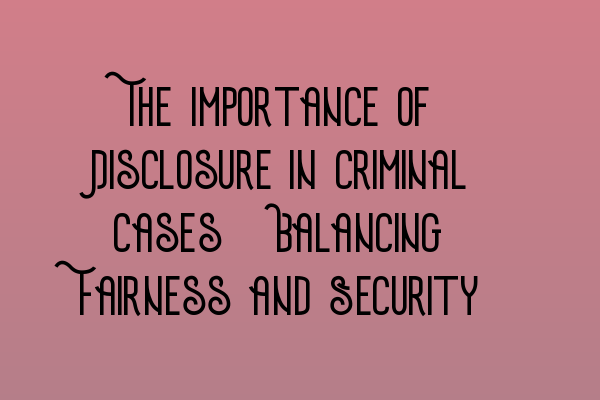The Importance of Disclosure in Criminal Cases: Balancing Fairness and Security
Disclosure plays a vital role in criminal cases, ensuring a balance between the interests of the accused and the needs of justice. It is a fundamental principle that guides the fairness of criminal proceedings.
What is Disclosure?
Disclosure refers to the process by which the prosecution must share the evidence they possess with the defense in a criminal case. This evidence can include documents, witness statements, expert reports, or any material that could be relevant to the case. The purpose of disclosure is to ensure transparency and enable the accused to prepare a robust defense.
The Importance of Fairness
Fairness is a cornerstone of the criminal justice system. Without access to all relevant evidence, the accused could be wrongly convicted or denied the opportunity to present a strong defense. Disclosure ensures that individuals are given a fair opportunity to challenge the prosecution’s case and present their own evidence.
Ensuring Security
While disclosure is crucial for fairness, there are also considerations of security, especially in sensitive cases. The disclosure process must strike a balance between the rights of the accused and the protection of individuals or information that may be at risk. This delicate balance is carefully managed to prevent any harm while upholding the principles of justice.
Disclosure Obligations
The prosecution has a legal and ethical duty to disclose all relevant evidence to the defense. Failure to disclose can result in serious consequences, including potential mistrials or appeals. The disclosure obligations are designed to ensure that justice is served and that both the prosecution and defense have access to the same evidence.
Challenges in Disclosure
Disclosure can be a complex process, particularly in cases with vast amounts of evidence or sensitive information. In recent years, advancements in technology and the increasing amount of digital evidence have posed new challenges. It is essential for legal professionals to stay updated on evolving practices and tools to effectively handle disclosure.
The Role of Legal Professionals
Legal professionals, including solicitors and barristers, have a crucial role to play in ensuring disclosure is carried out effectively. They must meticulously review the evidence provided by the prosecution, identify any gaps or inconsistencies, and request further disclosure if necessary. By meticulously analyzing the disclosure, legal professionals can build a robust defense strategy and protect the rights of their clients.
The Future of Disclosure
The legal landscape is constantly evolving, and disclosure processes are no exception. With the implementation of the Solicitors Qualifying Examination (SQE) in the UK, aspiring solicitors must have a thorough understanding of the importance of disclosure and the skills to navigate the complexities of the process.
To prepare for the SQE exams and gain a comprehensive understanding of criminal law and practice, it is highly recommended to enroll in SQE 1 preparation courses and SQE 2 preparation courses. These courses will provide aspiring solicitors with the knowledge and skills necessary to succeed in their legal careers.
Conclusion
Disclosure is a critical aspect of criminal cases, ensuring fairness and balancing the rights of the accused with the needs of justice. Legal professionals must navigate the complexities of disclosure to build robust defense strategies and uphold the principles of a fair trial. By staying updated on the evolving practices and enrolling in SQE preparation courses, aspiring solicitors can equip themselves with the necessary skills to excel in their legal careers.
For further resources and practice, you can check out the following related articles:
